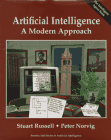|
|
CS 371 - Introduction to Artificial Intelligence |
Course Information |
Presented with the unifying theme of constructing intelligent software
agents, we survey an interesting variety of research problems and modern
problem solving techniques. Among the topics we cover are: search,
game-tree search, constraint satisfaction, knowledge representation and
reasoning, reasoning under uncertainty, planning, machine learning, robotics,
machine vision, natural language processing, and philosophical foundations.
 |
Stuart J. Russell, Peter Norvig
Artificial Intelligence: A Modern Approach Prentice Hall; ISBN: 0131038052 |
You are responsible to know the material from each lecture and reading assignment before the start of the next class. For this reason, it is very important to avoid getting behind in your assignment. One class meeting late incurs a grading penalty of 50%. No credit will be given for work two or more class meetings late.
Approximately 10 in-class quizzes will be given in the course of the semester. Quizzes cannot be made up if one is late or absent without good reason. They are not intended to be overly challenging or require speed. Rather, these quizzes are intended to serve as (1) a diagnostic of your progress, and (2) a tool for accountability. We care about how you're learning all the time (not just at mid-term or semester's end).
Class attendance and participation is required. If you're attending
class and willing to participate, you'll get 100% for this part of your
grade.